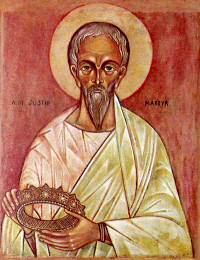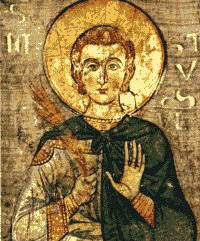Ordinary Time: June 1st
Memorial of St. Justin, martyr
Other Commemorations: Feast of Our Lord Jesus Christ, the Eternal High Priest (particular calendars)
» Enjoy our Liturgical Seasons series of e-books!
Worldwide Holy Hour with Pope Francis
St. Justin, apologist and martyr, was one of the most important Christian writers of the second century. He himself tells how his study of all the schools of philosophy led him to Christianity, and how he dedicated his life to the defense of the Christian faith as "the one certain and profitable philosophy."
St. Justin is particularly celebrated for the two Apologies which he was courageous enough to address in succession to the persecuting emperors Antoninus and Marcus Aurelius. One of them contains a description of the rites of baptism and the ceremonies of Mass, thus constituting the most valuable evidence that we possess on the Roman liturgy of his day. He was beheaded in Rome in 165. Justin is also referred to as "the Philosopher."
According to the 1962 Missal of Bl. John XXIII the Extraordinary Form of the Roman Rite, today is the feast of St. Angela Merici. Her feast is now celebrated on January 27. St. Justin's feast was celebrated on April 14.
Worldwide Holy Hour
Tomorrow, Sunday, June 2, Pope Francis will lead a worldwide hour of Eucharistic adoration the Vatican has announced.
On that date, cathedrals all across the world will hold an hour of Eucharistic adoration at the same time, inviting the faithful to pray for the Pope's intentions. The worldwide session of adoration will take place from 5 to 6 Sunday afternoon in Rome, and cathedrals worldwide will synchronize their vigils to match that time. The Pope has asked the universal Church to pray for two intentions during the hour of adoration:
- For the Church spread throughout the world and united today in the adoration of the Most Holy Eucharist as a sign of unity. May the Lord make her ever more obedient to hearing his Word in order to stand before the world `ever more beautiful, without stain or blemish, but holy and blameless.' That through her faithful announcement, the Word that saves may still resonate as the bearer of mercy and may increase love to give full meaning to pain and suffering, giving back joy and serenity.
- For those around the world who still suffer slavery and who are victims of war, human trafficking, drug running, and slave labor. For the children and women who are suffering from every type of violence. May their silent scream for help be heard by a vigilant Church so that, gazing upon the crucified Christ, she may not forget the many brothers and sisters who are left at the mercy of violence. Also, for all those who find themselves in economically precarious situations, above all for the unemployed, the elderly, migrants, the homeless, prisoners, and those who experience marginalization. That the Church's prayer and its active nearness give them comfort and assistance in hope and strength and courage in defending human dignity.
The worldwide hour of Eucharistic adoration is one of two initiatives for the Year of Faith, announced on May 28 by the Pontifical Council for the New Evangelization.
St. Justin
Justin, the son of Priscus, was a Greek by race, and was born at Nablus in Palestine. He passed his youth in the study of letters. When he grew to manhood he was so taken with the love of philosophy and the desire of truth, that he became a student of philosphy and examined the teaching of all the philosophers. He found in them only deceitful wisdom and error. He received the light of heaven from a venerable old man, who was a stranger to him, and embraced the philosophy of the true Christian faith. Henceforth he had the books of Holy Scripture in his hands by day and night, and his soul was filled with the divine fire enkindled by his meditations. Having thus acquired the excellent knowledge of Jesus Christ, he devoted his learning to the composition of many books explaining and propagating the Christian faith.
Among the most famous of the works of Justin are his two Apologies or Defenses of the Christian faith. These he offered in the Senate to the Emperor Antoninus Pius and his sons, together with Marcus Antoninus Verus and Lucius Aurelius Commodus, who were cruelly persecuting the followers of Christ. By these Apologies and his vigorous disputations in defense of the faith he obtained a public edict from the government to stay the slaughter of the Christians. But Justin himself did not escape. He had blamed the wicked life led by Crescens the Cynic, who caused him to be accused and arrested.  He was brought before Rusticus, the Prefect of Rome, and questioned concerning the doctrine of the Christians. Whereupon he made this good confession in the presence of many witnesses: "The right doctrine which we Christian men do keep with godliness is this: that we believe that there is one God, the maker and creator of all things, both those which are seen and those which bodily eyes do not see; and that we confess the Lord Jesus Christ, the Son of God, who was of old foretold by the Prophets, and who is to come to judge all mankind."
He was brought before Rusticus, the Prefect of Rome, and questioned concerning the doctrine of the Christians. Whereupon he made this good confession in the presence of many witnesses: "The right doctrine which we Christian men do keep with godliness is this: that we believe that there is one God, the maker and creator of all things, both those which are seen and those which bodily eyes do not see; and that we confess the Lord Jesus Christ, the Son of God, who was of old foretold by the Prophets, and who is to come to judge all mankind."
In his first Apology Justin had given, in order to rebut the slanders of the heathen, an open account of the Christian assemblies and of the holy Mysteries there celebrated. The prefect asked him in what place he and Christ's other faithful servants in the city were accustomed to meet. But Justin, fearing to betray the holy mysteries and his brethren, mentioned only his own dwelling near the famous church in the house of Pudens, where he lived and taught his disciples. The prefect then bade him choose whether he would sacrifice to the gods or suffer a cruel scourging. The unconquered champion of the faith answered that he had always desired to suffer for the Lord Jesus Christ, from whom he hoped to receive a great reward in heaven. The prefect thereupon sentenced him to death, and thus this excellent philosopher, giving praise to God, suffered the pain of scourging, and then shed his blood for Christ, and was crowned with martyrdom. Some of the faithful stole away his body and buried it in a fitting place.
—Excerpted from The Liturgical Year, Abbot Gueranger O.S.B.
Patronage: Apologists; lecturers; orators; philosophers; speakers.
Symbols and Representation: Ox; pen; sword; red-hot helmet.
Highlights and Things to Do:
- St. Justin was a prolific writer, and one of the first Christians to write about the Eucharistic liturgy of the early church. See Catholic Culture's Collection of Fathers of the Church Writings to read some of St. Justin's writings. Read some of Early Christian Writings also has a collection.
- Read this account of St. Justin's life and another account from the Church Fathers of his martyrdom.
- The Catholic Encyclopedia has an excellent entry on St. Justin. Their summary: "The role of St. Justin may be summed up in one word: it is that of a witness. We behold in him one of the highest and purest pagan souls of his time in contact with Christianity, compelled to accept its irrefragable truth, its pure moral teaching, and to admire its superhuman constancy. He is also a witness of the second-century Church which he describes for us in its faith, its life, its worship, at a time when Christianity yet lacked the firm organization that it was soon to develop, but the larger outlines of whose constitution and doctrine are already luminously drawn by Justin. Finally, Justin was a witness for Christ unto death."
- Catholic Culture has several resources dedicated to St. Justin. See
- Way of the Fathers: Episode 9—Justin Martyr: Everything Good Is Ours by Mike Aquilina
- Catholic Culture Audiobooks: St. Justin Martyr—Dialogue with Trypho (excerpt) by James Majewski
- Church Fathers: St. Justin Martyr by Thomas Mirus
- Read more about St. Justin:
- Read Pope Benedict XVI's General Audience Address March 21, 2007 on St. Justin.








